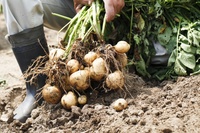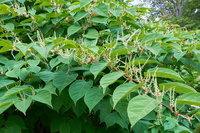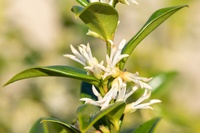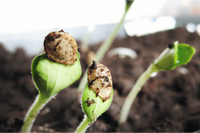
As September arrives, the garden starts to glow with rich color, and late-flowering plants look stunning in the soft fall light. With fruit and veg to harvest and plans to be made for spring, there’s no shortage of tasks to tackle, and here are our top 15 gardening tasks for September.
Top 15 gardening tasks for September
-
Trim the foliage on maincrop potatoes and wait a couple of weeks, then start digging up the potatoes – kids will love this task! Leave the potatoes to dry for a few hours before storing them in paper bags or hessian sacks. (Take care not to damage the potatoes when digging them up if you want to store them.)
-
Keep picking the last of your French and runner beans, then cut the plants down to ground level and leave the roots to release their stored nitrogen into the soil.
-
Prune summer raspberries, cutting down the fruited canes to ground level. Tie in this year’s new growth to support – these stems will bear next year’s fruit.
-
It’s a fruit bonanza in the orchard this month! Plums, pears, apples, blackberries, and autumn raspberries are all ready to harvest now.

-
Plant fall-planting onion and garlic sets for an earlier harvest next year. Plan for spring by sowing spinach and spring onions, and cover the seedlings with fleece to protect them against frost.
-
Plant out biennials like wallflowers and Sweet Williams, giving them time to settle in before winter, ready to flower next year.
-
Sow hardy annuals like nigella, poppies, and cornflowers for a fabulous late spring display – they’ll flower earlier than annuals sown next spring.
-
Keep up with deadheading – late summer stalwarts like dahlias, roses, and penstemons will keep on flowering into fall if regularly deadheaded.
-
Trim back perennials as they start to fade, remembering to leave a few hollow stems standing to provide homes for insects over winter.
-
Divide and lift overgrown clumps of geraniums, hostas, and daylilies. As well as rejuvenating the plants, this also gives you a free supply of extra plants to fill any gaps in the garden.
-
September is a good month to plant new perennials while the soil is still warm from summer, and there’s likely to be plenty of rain to keep them watered.

-
Begin planting spring bulbs like hyacinths, daffodils, and crocuses. Wait until November to plant tulips, as the colder temperatures reduce the risk of the bulbs being affected by viruses like tulip fire.
-
Now is the time for lawn maintenance. Scarify, aerate, and feed your lawn, using an autumn lawn feed high in potassium which will help strengthen the grass before winter.
-
Keep camellias and rhododendrons well-watered this month while they develop their flower buds for next year.
-
As light levels drop, wash any shading paint from greenhouse windows or remove blinds.
Get your garden prepared for next year with our wide range of seeds, plants, and garden equipment. Visit us today!




